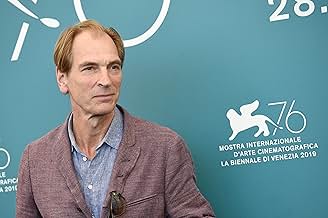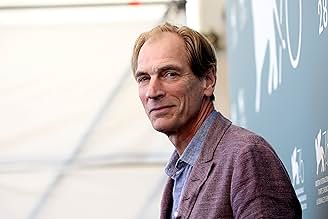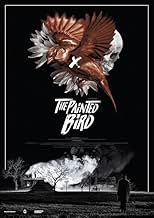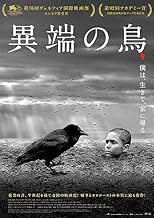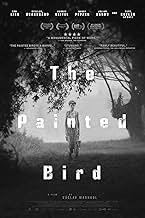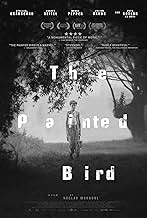IMDb RATING
7.3/10
8.3K
YOUR RATING
A young Jewish boy somewhere in Eastern Europe seeks refuge during World War II where he encounters many different characters.A young Jewish boy somewhere in Eastern Europe seeks refuge during World War II where he encounters many different characters.A young Jewish boy somewhere in Eastern Europe seeks refuge during World War II where he encounters many different characters.
- Awards
- 24 wins & 24 nominations total
Nina Sunevic
- Marta
- (as Nina Shunevych)
Marika Sarah Procházková
- Woman #1
- (as Marika Procházková)
Featured reviews
It's an eastern european movie at its core: raw, uncompromising, brutal, dim, hopeless and honest.
Brutality actually lead to several people leaving the screening I attended to at Venice 76. Here, this movie was labeled as '14+' but I believe it can be easily rated NC-17. The brutality of this movie includes some very graphic gore (although it's mostly present in the first half of the movie) and sexual-related violence (mostly implied but persistent throughout the film). I believe that, as of on-screen depiction of violence, this film probably outranks Schindler's List (although It isn't as vast scaled as Spielberg's film).
Stylistically, this film uses mostly the visual medium rather than conversations to provide information to the viewer. Dialogue becomes secondary at a point where the main character maybe utters a couple of lines throughout the movie, and some of the characters he meets with are entirely silent (Skasgard's character, for example).
The film has a very precise structure: it is made up of 8 chapters, each entitled after a character that the kid meets with, and each chapter reaches a moment when the screen fades to black. After that, a sort-of connective sequence displays the events that lead the kid to change his whereabouts. Among the characters he meets, the audience might recognize Alexander Skasgard, but also Harvey Keitel (in an entirely czech-speaking role) as well as Barry Pepper and german actor Udo Kier.
I wouldn't say that The Painted Bird is a holocaust or ww2 movie, or better, it isn't only that. Thematic elements that relate to either the Holocaust or the War, with the exception of a german plane seen early on, come up only after around one hour in-movie. Before that, whatever happens is mostly related to a strongly rural and superstitious society.
The Painted Bird pays implicit homage to several Eastern European films. The opening sequence mimics the one seen in Jan Nemec's "Diamonds of the Night", a lot of settings remind Elem Klimov's "Come and See" and Tarkovsky's "Ivan's Childhood", the overall fatalist tone reminds strongly of Bela Tarr's films.
It is an outstanding accomplishment, and I sincerely hope that this movie, despite its graphic content, receives enough recognition.
Brutality actually lead to several people leaving the screening I attended to at Venice 76. Here, this movie was labeled as '14+' but I believe it can be easily rated NC-17. The brutality of this movie includes some very graphic gore (although it's mostly present in the first half of the movie) and sexual-related violence (mostly implied but persistent throughout the film). I believe that, as of on-screen depiction of violence, this film probably outranks Schindler's List (although It isn't as vast scaled as Spielberg's film).
Stylistically, this film uses mostly the visual medium rather than conversations to provide information to the viewer. Dialogue becomes secondary at a point where the main character maybe utters a couple of lines throughout the movie, and some of the characters he meets with are entirely silent (Skasgard's character, for example).
The film has a very precise structure: it is made up of 8 chapters, each entitled after a character that the kid meets with, and each chapter reaches a moment when the screen fades to black. After that, a sort-of connective sequence displays the events that lead the kid to change his whereabouts. Among the characters he meets, the audience might recognize Alexander Skasgard, but also Harvey Keitel (in an entirely czech-speaking role) as well as Barry Pepper and german actor Udo Kier.
I wouldn't say that The Painted Bird is a holocaust or ww2 movie, or better, it isn't only that. Thematic elements that relate to either the Holocaust or the War, with the exception of a german plane seen early on, come up only after around one hour in-movie. Before that, whatever happens is mostly related to a strongly rural and superstitious society.
The Painted Bird pays implicit homage to several Eastern European films. The opening sequence mimics the one seen in Jan Nemec's "Diamonds of the Night", a lot of settings remind Elem Klimov's "Come and See" and Tarkovsky's "Ivan's Childhood", the overall fatalist tone reminds strongly of Bela Tarr's films.
It is an outstanding accomplishment, and I sincerely hope that this movie, despite its graphic content, receives enough recognition.
'The Painted Bird' (2019) by Czech director Václav Marhoul is a very difficult film to evaluate. On the one hand, from a cinematic point of view, it is one of the remarkable performances we have seen in recent years - impeccably technical, with many interesting innovations that serve the narrative and messages of the film. It is a film about the Holocaust, an inexhaustible historical and human theme, and more precisely about the destiny of a child in those terrible times - so a story of those with which viewers identify emotionally. Here, however, the issue of this construction also appears. The series of horrors that pervade the screen hardly coexists with the inevitable sensitivity of the spectators when it comes to children's fates on screen. The film is an indictment against a war-torn dehumanised Europe, cruel or at best indifferent to the fate of children separated from their parents by the brutality of war, witnesses and often even victims of the most terrible torture and abuse. There is a complicated history around the film, which adds complexity to the whole edifice and makes it even more difficult to appreciate this film which is both difficult to watch and impossible to ignore as cinematic value and message.
Joska, the main hero, is a Jewish boy on the verge of adolescence, maybe 10-11 years old, who is sent by his parents to an aunt living in a distant place to be saved from deportation. The aunt dies suddenly and the boy embarks alone on a journey home through war-torn Central Europe. On the way he will meet different people, traumatised and impoverished by war. Few will help him, most will exploit, hit, humiliate him. The horrors he will witness and the trials this boy goes through are extreme - from violence and slavery to torture, rape and sexual perversions. Almost the entire repertoire of human cruelty is present in this film. Under these conditions, the boy is in danger to lose his humanity, his sense of good and evil, his appreciation of the value of life, and his identity. Is it still possible for him to recover and return to a normal life after individual traumas of such intensity and proportions? The elliptically beautiful final leaves this question open.
The Europe described by Václav Marhoul contains enough historical hints that allow to locate the story in the film in time in 1944-1945, the last years of World War II, but at the same time many of the scenes take place in a rural setting that could belong to any of the historical periods when Europe was torn apart by wars from the Middle Ages to the present day. Geographical area is treated similarly. The novel that inspired the film is written (in English) by the Polish Jerzy Kosinski, but the producers of 'The Painted Bird' made efforts to avoid a precise location, up to inventing a hybrid language that is used by the villagers in the film, language which combines Czech, Slovak and Polish spoken in central Europe. The cinematography signed by Vladimír Smutný is remarkable, using aesthetically and expressively black and white and the widescreen format of some of Ingmar Bergman's famous films. Much of the film's burden lies on the shoulders of child actor Petr Kotlár, who does not say a word throughout the film, but whose eyes are witnesses to the horrors outside and the suffering inside. The rest of the cast includes a consistent series of portraits, very well made, with realism and naturalism, and played mostly by Czech actors whom we do not know, but also with a few exceptions of celebrities such as Stellan Skarsgård or Harvey Keitel, excellently integrated. As in the masters' films, 'The Painted Bird' is divided into episodes, each bearing the names of some of the human or inhuman people that Joska encounters on his way. Kosinski's novel aroused controversy similar to that now aroused by the film, due to the accumulation of extreme scenes of violence and sex, but also because what was originally presented and promoted as an autobiographical story proved to be rather a synthesis of stories, gathered disparately from the testimonies of several survivors who lived the Holocaust in childhood. In a world where direct witnesses are almost non-existent and where deniers are making their voices heard louder and louder, even works of fiction such as the book and film 'The Painted Bird' must be credible. It is not the description of the extremes that seems problematic to me, but rather their gathering in a single biography. Lack of credibility also harms the emotional involvement of viewers. The temporal and geographical generalisation introduced in the film solves, I think, only partially this problem.
Joska, the main hero, is a Jewish boy on the verge of adolescence, maybe 10-11 years old, who is sent by his parents to an aunt living in a distant place to be saved from deportation. The aunt dies suddenly and the boy embarks alone on a journey home through war-torn Central Europe. On the way he will meet different people, traumatised and impoverished by war. Few will help him, most will exploit, hit, humiliate him. The horrors he will witness and the trials this boy goes through are extreme - from violence and slavery to torture, rape and sexual perversions. Almost the entire repertoire of human cruelty is present in this film. Under these conditions, the boy is in danger to lose his humanity, his sense of good and evil, his appreciation of the value of life, and his identity. Is it still possible for him to recover and return to a normal life after individual traumas of such intensity and proportions? The elliptically beautiful final leaves this question open.
The Europe described by Václav Marhoul contains enough historical hints that allow to locate the story in the film in time in 1944-1945, the last years of World War II, but at the same time many of the scenes take place in a rural setting that could belong to any of the historical periods when Europe was torn apart by wars from the Middle Ages to the present day. Geographical area is treated similarly. The novel that inspired the film is written (in English) by the Polish Jerzy Kosinski, but the producers of 'The Painted Bird' made efforts to avoid a precise location, up to inventing a hybrid language that is used by the villagers in the film, language which combines Czech, Slovak and Polish spoken in central Europe. The cinematography signed by Vladimír Smutný is remarkable, using aesthetically and expressively black and white and the widescreen format of some of Ingmar Bergman's famous films. Much of the film's burden lies on the shoulders of child actor Petr Kotlár, who does not say a word throughout the film, but whose eyes are witnesses to the horrors outside and the suffering inside. The rest of the cast includes a consistent series of portraits, very well made, with realism and naturalism, and played mostly by Czech actors whom we do not know, but also with a few exceptions of celebrities such as Stellan Skarsgård or Harvey Keitel, excellently integrated. As in the masters' films, 'The Painted Bird' is divided into episodes, each bearing the names of some of the human or inhuman people that Joska encounters on his way. Kosinski's novel aroused controversy similar to that now aroused by the film, due to the accumulation of extreme scenes of violence and sex, but also because what was originally presented and promoted as an autobiographical story proved to be rather a synthesis of stories, gathered disparately from the testimonies of several survivors who lived the Holocaust in childhood. In a world where direct witnesses are almost non-existent and where deniers are making their voices heard louder and louder, even works of fiction such as the book and film 'The Painted Bird' must be credible. It is not the description of the extremes that seems problematic to me, but rather their gathering in a single biography. Lack of credibility also harms the emotional involvement of viewers. The temporal and geographical generalisation introduced in the film solves, I think, only partially this problem.
Greetings again from the darkness. Polish-American writer Jerzy Kosinski's 1965 novel "The Painted Bird" has one of the strangest and most controversial histories of any book. Initially celebrated as an extraordinary piece on the Holocaust era, the novel was banned in Poland, and author Kosinski was accused of falsifying claims of it being an autobiographical work. Later he was accused of plagiarism for this book and his 1970 book "Being There" (adapted into a 1979 movie starring Peter Sellers). This story of a young Jewish boy, abandoned by his parents and traveling the Eastern Europe countryside during WWII, is now accepted as a blend of fiction and his friend (director) Roman Polanski's experiences. Czech filmmaker Vaclav Marhoul has turned the book into a stunning viewing experience.
First time actor Petr Kotlar is extraordinary as the unnamed (until the end) Jewish boy on a journey that might be entitled Dante's Circle of Abuse or Homer's Odyssey of Misery. This is a young boy in need of kindness from strangers, but unable to find much. The film opens with the boy running through the woods carrying what appears to be his pet ferret. He's being chased by a group of sadistic Anti-Semite bullies. It's a chase that doesn't end well. We learn the boy is living with his "Auntie" Marta (Nina Sunevic) on her rundown farm, and we intuit that his parents thought he would be safer here than with them. When the woman dies suddenly and unexpectedly, the boy accidentally burns the house down, kicking off his walk across the countryside. Almost inexplicably, this is the most upbeat segment of the film.
Director Marhoul divides the film into 9 chapters, each named after the person the boy meets and lives with temporarily. I'll recap the following eight chapters with a focus on not giving away too much ... just know that this film is unrelenting in its brutality and bleakness. After Marta's death, the boy stumbles into a village where he is considered cursed and labeled a vampire. The witch doctor Olga (Ala Sakalova) enslaves him until he escapes down river, where he is rescued by a mill worker. The head miller (Udo Kier) is a frightening man who takes exception with his worker (not the boy) gazing lustfully at his wife. Kier's eyes manage to burn right through the black and white film, and soon he turns exceedingly violent towards his wife and the worker, leaving us with an unforgettable visual.
The boy then finds himself at the home of Lekhi (Lech Dyblik) who captures wild birds and regularly hooks up with Ludmila (Jitka Cvancorova), a wild woman who lives in the forest. The boy witnesses two horrific deaths, but not before the sequence which gives the film its title and ensures we understand what happens to outcasts - those who are different. At about the one hour mark, the boy finds an injured horse and walks it into the local village. It's at this point where we hear him speak (kind of) for the first time. A violent Russian invasion of the village results in the Cossacks offering the bound and gagged Jewish boy to the German soldiers as a "gift". Stellan Skarsgard is the veteran soldier who draws the assignment of taking the boy into the woods to shoot him.
When the soldier sends him on his way, a sickly Catholic Priest (Harvey Keitel) takes the boy under his wing and trains him to be an altar boy. All is fine until a parishioner (Julian Sands) with despicable intentions agrees to take the boy in and provide for him. This segment has what may be the most cringe-inducing death scene in the film, after which we find the boy trudging through snow and falling through ice, and crawling towards a cabin where Labrina (Julia Valentova) and a sickly old man live. The boy faces more abuse as he's incapable of pleasing Labrina, which leads to situations he's much too young to understand. Traumatized, the boy's personality takes a turn.
In his next village, an attack by Germans puts the boy in contact with Russian sniper Mitka (Barry Pepper), who leaves him with the real life advice of, "an eye for an eye, and a tooth for a tooth." Having only recently lost his innocence, the advice hits home for the boy. He ends up in an orphanage where a surprise occurs that causes the boy to lash out in anger ... at least until he observes something that makes him understand the world has been cruel to others, not just him.
Normally, I wouldn't recap or outline the segments of a movie in this manner, but it's crucial to understand what you are about to watch. It's a nearly 3 hour epic of human cruelty and survival instinct. Young Petr Kotlar spends much of the movie taking and witnessing abuse while his face is near emotionless (save for a couple of extremes). Joy is elusive, if not non-existent. The film shows us not all Holocaust horrors occurred in death camps. The atrocities of war and the cruelty of humans result in a film that is beyond bleak at times, but also makes a clear point about how differently people treat those not "like" us, regardless who the "us" is. This point is as evident today as it was during WWII.
Director Marhoul excels in showing, rather than telling ... there is almost no 'telling' throughout the film. Cinematographer Vladimir Smutney makes expert use of the 35mm black & white film to provide images that are stark and brutal like the world the boy sees. The Production Design from Jan Vlasak puts us right in the muck, while the Sound from Jakub Cech is crucial to every scene.
The film is a joint project of Czech Republic, Slovakia, and Ukraine, as Poland refused to participate. It had quite the festival run last year, including some high profile walk-outs during the Venice Film Festival. It's one of the rare movies that every cinephile is thankful to have seen, yet as human beings, we would likely never want to watch again. Murder, abuse, suicide, torture, bestiality, rape, violence, cruelty, slaughter, pedophilia, incest, war atrocities ... these aren't topics we typically seek out, and they thankfully aren't topics that all show up in a single movie very often! There are a few moments of compassion if you watch closely, but mostly it's a reminder of the cruelty of humans when the structure of society collapses, and hope is hard to come by. As Edwin Starr sang in his number one hit in 1970, "War, good God. What is it good for? Absolutely nothing."
First time actor Petr Kotlar is extraordinary as the unnamed (until the end) Jewish boy on a journey that might be entitled Dante's Circle of Abuse or Homer's Odyssey of Misery. This is a young boy in need of kindness from strangers, but unable to find much. The film opens with the boy running through the woods carrying what appears to be his pet ferret. He's being chased by a group of sadistic Anti-Semite bullies. It's a chase that doesn't end well. We learn the boy is living with his "Auntie" Marta (Nina Sunevic) on her rundown farm, and we intuit that his parents thought he would be safer here than with them. When the woman dies suddenly and unexpectedly, the boy accidentally burns the house down, kicking off his walk across the countryside. Almost inexplicably, this is the most upbeat segment of the film.
Director Marhoul divides the film into 9 chapters, each named after the person the boy meets and lives with temporarily. I'll recap the following eight chapters with a focus on not giving away too much ... just know that this film is unrelenting in its brutality and bleakness. After Marta's death, the boy stumbles into a village where he is considered cursed and labeled a vampire. The witch doctor Olga (Ala Sakalova) enslaves him until he escapes down river, where he is rescued by a mill worker. The head miller (Udo Kier) is a frightening man who takes exception with his worker (not the boy) gazing lustfully at his wife. Kier's eyes manage to burn right through the black and white film, and soon he turns exceedingly violent towards his wife and the worker, leaving us with an unforgettable visual.
The boy then finds himself at the home of Lekhi (Lech Dyblik) who captures wild birds and regularly hooks up with Ludmila (Jitka Cvancorova), a wild woman who lives in the forest. The boy witnesses two horrific deaths, but not before the sequence which gives the film its title and ensures we understand what happens to outcasts - those who are different. At about the one hour mark, the boy finds an injured horse and walks it into the local village. It's at this point where we hear him speak (kind of) for the first time. A violent Russian invasion of the village results in the Cossacks offering the bound and gagged Jewish boy to the German soldiers as a "gift". Stellan Skarsgard is the veteran soldier who draws the assignment of taking the boy into the woods to shoot him.
When the soldier sends him on his way, a sickly Catholic Priest (Harvey Keitel) takes the boy under his wing and trains him to be an altar boy. All is fine until a parishioner (Julian Sands) with despicable intentions agrees to take the boy in and provide for him. This segment has what may be the most cringe-inducing death scene in the film, after which we find the boy trudging through snow and falling through ice, and crawling towards a cabin where Labrina (Julia Valentova) and a sickly old man live. The boy faces more abuse as he's incapable of pleasing Labrina, which leads to situations he's much too young to understand. Traumatized, the boy's personality takes a turn.
In his next village, an attack by Germans puts the boy in contact with Russian sniper Mitka (Barry Pepper), who leaves him with the real life advice of, "an eye for an eye, and a tooth for a tooth." Having only recently lost his innocence, the advice hits home for the boy. He ends up in an orphanage where a surprise occurs that causes the boy to lash out in anger ... at least until he observes something that makes him understand the world has been cruel to others, not just him.
Normally, I wouldn't recap or outline the segments of a movie in this manner, but it's crucial to understand what you are about to watch. It's a nearly 3 hour epic of human cruelty and survival instinct. Young Petr Kotlar spends much of the movie taking and witnessing abuse while his face is near emotionless (save for a couple of extremes). Joy is elusive, if not non-existent. The film shows us not all Holocaust horrors occurred in death camps. The atrocities of war and the cruelty of humans result in a film that is beyond bleak at times, but also makes a clear point about how differently people treat those not "like" us, regardless who the "us" is. This point is as evident today as it was during WWII.
Director Marhoul excels in showing, rather than telling ... there is almost no 'telling' throughout the film. Cinematographer Vladimir Smutney makes expert use of the 35mm black & white film to provide images that are stark and brutal like the world the boy sees. The Production Design from Jan Vlasak puts us right in the muck, while the Sound from Jakub Cech is crucial to every scene.
The film is a joint project of Czech Republic, Slovakia, and Ukraine, as Poland refused to participate. It had quite the festival run last year, including some high profile walk-outs during the Venice Film Festival. It's one of the rare movies that every cinephile is thankful to have seen, yet as human beings, we would likely never want to watch again. Murder, abuse, suicide, torture, bestiality, rape, violence, cruelty, slaughter, pedophilia, incest, war atrocities ... these aren't topics we typically seek out, and they thankfully aren't topics that all show up in a single movie very often! There are a few moments of compassion if you watch closely, but mostly it's a reminder of the cruelty of humans when the structure of society collapses, and hope is hard to come by. As Edwin Starr sang in his number one hit in 1970, "War, good God. What is it good for? Absolutely nothing."
This is like a gift giver that just keeps on giving. Never once throughout the almost three hour run time was I bored. I was captivated from the very first minute right up until the final fade out.
We follow a young Jewish boy trying to survive amidst the chaos of World War II. His luck is horrible and he is subjected to a series of abuses and abusers.
Stay with him, the Painted Bird pays off and will linger in your mind long after you've seen it.
9/10
We follow a young Jewish boy trying to survive amidst the chaos of World War II. His luck is horrible and he is subjected to a series of abuses and abusers.
Stay with him, the Painted Bird pays off and will linger in your mind long after you've seen it.
9/10
"The Painted Bird" (2019 release from the Czech Republic; 169 min.) brings the story of a young (Jewish, we later learn) boy, never mentioned by name and simply known as "the Boy". As the movie opens, the Boy is running in the woods holding a pet, only to be brutally attacked by other boys, who also burn his pet alive. The Boy returns to home, home being a remote place with his aunt somewhere in Eastern Europe in the late stages of WWII. When his aunt dies (and he accidentally sets the place on fire), he is forced to find his way, but to where? This is the start of a long journey. At this point we are less than 15 min. into the movie but to tell you more of the plot would spoil your viewing experience, you'll just have to see for yourself how it all plays out.
Couple of comments: this is the big screen adaptation of the book of the same name. I haven't read the book, so I cannot comment how closely the film sticks to the book. To say that the book, and now the film, have been controversial would be the understatement of the year. The film is brought in chapters, each called for the person(s) in care of the young boy, maybe 9 or 10 years old: "Marta" (his aunt) start things off. The first hour of the movie is surreal and shocking on many levels, as the boy endures cruelty upon cruelty, Along the way we also watch animal cruelty, spousal abuse, and worse. Cheerier times are far away. Yet as we endure this, we also become strongly attached to the survival journey and fate of the boy: what will become of him? The movie is shot entirely in B&W, reflecting the gloomy atmosphere of remote Eastern Europe. There are some spectacular acting performances, none more so than the boy who plays the Boy, but also keep your eye out for Harvey Keitel, yes THE Harvey Keitel, playing a priest who takes the Boy under his wings for a while. BEWARE: there are a number of disturbing scenes in the film, and to say that this isn't for the faint of heart would be the understatement of the year. Yet if you can handle it, you are in for a WILD and moving but bleak tale of a young boy's WWII survival drama, the likes of which you surely haven't seen before.
"The Painted Bird" premiered to controversy and critical acclaim at the same time at last Fall's Venice Film Festival. It opened this weekend at my local art-house theater here in Cincinnati, and I couldn't wait to see it. The theater is adhering strictly to CDC guidelines in this COVID-19 pandemic. Not that it mattered as the Friday early evening screening where I saw this at turned out to be a private screening, as in: I was literally the only person in the theater. If you are in the mood for a grim and bleak but extraordinary tale of what trying to survive WWII might've looked like for a young Jewish boy, I'd readily suggest you check this out, be it in the theater (if you can), on VOD, or on DVD/Blu-ray, and draw your own conclusion.
Couple of comments: this is the big screen adaptation of the book of the same name. I haven't read the book, so I cannot comment how closely the film sticks to the book. To say that the book, and now the film, have been controversial would be the understatement of the year. The film is brought in chapters, each called for the person(s) in care of the young boy, maybe 9 or 10 years old: "Marta" (his aunt) start things off. The first hour of the movie is surreal and shocking on many levels, as the boy endures cruelty upon cruelty, Along the way we also watch animal cruelty, spousal abuse, and worse. Cheerier times are far away. Yet as we endure this, we also become strongly attached to the survival journey and fate of the boy: what will become of him? The movie is shot entirely in B&W, reflecting the gloomy atmosphere of remote Eastern Europe. There are some spectacular acting performances, none more so than the boy who plays the Boy, but also keep your eye out for Harvey Keitel, yes THE Harvey Keitel, playing a priest who takes the Boy under his wings for a while. BEWARE: there are a number of disturbing scenes in the film, and to say that this isn't for the faint of heart would be the understatement of the year. Yet if you can handle it, you are in for a WILD and moving but bleak tale of a young boy's WWII survival drama, the likes of which you surely haven't seen before.
"The Painted Bird" premiered to controversy and critical acclaim at the same time at last Fall's Venice Film Festival. It opened this weekend at my local art-house theater here in Cincinnati, and I couldn't wait to see it. The theater is adhering strictly to CDC guidelines in this COVID-19 pandemic. Not that it mattered as the Friday early evening screening where I saw this at turned out to be a private screening, as in: I was literally the only person in the theater. If you are in the mood for a grim and bleak but extraordinary tale of what trying to survive WWII might've looked like for a young Jewish boy, I'd readily suggest you check this out, be it in the theater (if you can), on VOD, or on DVD/Blu-ray, and draw your own conclusion.
Did you know
- TriviaIn the 1960s, writer Jerzy Kosinski had become famous in Manhattan literary circles for his astonishing tales about the brutalities he had allegedly suffered during the Second World War. Abandoned by his parents at the age of six, he claimed he had roamed the countryside alone, witnessing rape, murder, and incest, constantly fearing for his life. Kosinski turned those stories into his first novel, "The Painted Bird", which, for a time, was considered a major work of Holocaust literature. Kosinski's claims were later debunked when it was revealed that he and his parents had all been sheltered by religious Poles who had never handed him over to the Nazis.
- GoofsAfter the old man died, Lubina rolled him face down in his grave. The next shot he lies face up.
- ConnectionsFeatured in CT na MFF Karlovy Vary 2019: Nabarvené ptáce (2019)
- SoundtracksFür Elise
Music by Ludwig van Beethoven
- How long is The Painted Bird?Powered by Alexa
Details
- Release date
- Countries of origin
- Official sites
- Languages
- Also known as
- The Painted Bird
- Filming locations
- Production companies
- See more company credits at IMDbPro
Box office
- Budget
- CZK 175,000,000 (estimated)
- Gross US & Canada
- $1,460
- Opening weekend US & Canada
- $452
- Jul 19, 2020
- Gross worldwide
- $659,535
- Runtime
- 2h 49m(169 min)
- Color
- Sound mix
- Aspect ratio
- 2.39 : 1
Contribute to this page
Suggest an edit or add missing content




